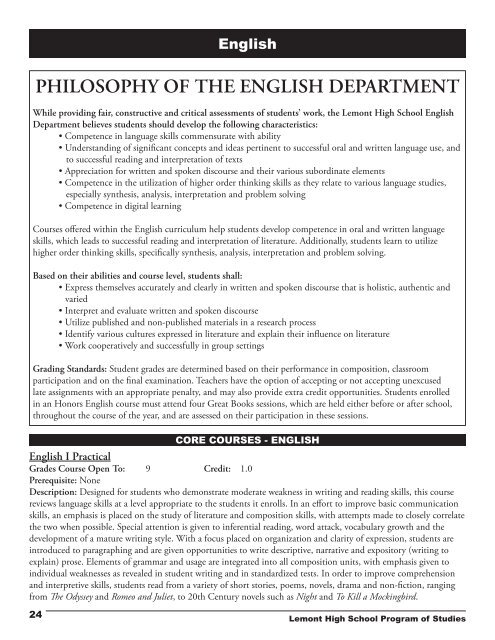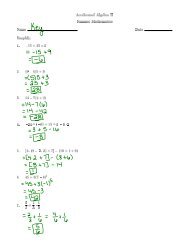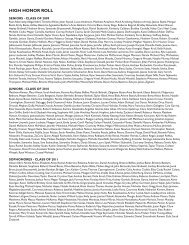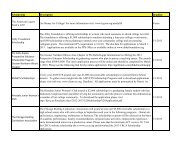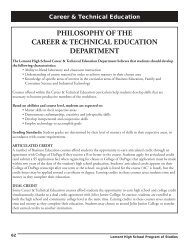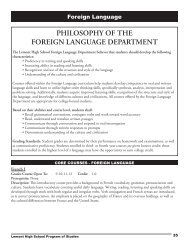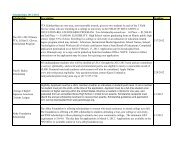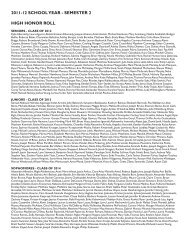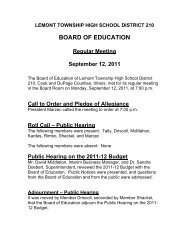philosophy of the english department - Lemont High School
philosophy of the english department - Lemont High School
philosophy of the english department - Lemont High School
Create successful ePaper yourself
Turn your PDF publications into a flip-book with our unique Google optimized e-Paper software.
EnglishEnglish II AcademicGrades Course Open To: 10 Credit: 1.0Prerequisite: Successful completion <strong>of</strong> English I Academic or consent <strong>of</strong> Division ChairDescription: This course continues to prepare <strong>the</strong> average or above-average student in <strong>the</strong> study <strong>of</strong> world literatureand composition skills. Attention is given to reading inferentially and making critical judgments regarding literature;subject matter can include a major three-act play, short stories, poetry and non-fiction. In composition studies,individual student weaknesses as revealed in standardized tests and in student writing are closely addressed. Studentswrite a variety <strong>of</strong> expository papers and a critical literary paper, with an emphasis on demonstrating support forconclusions reached in writing, expressing critical judgments and developing interpretive and comprehension skills.English II HonorsGrades Course Open To: 10 Credit: 1.0 - Honors creditPrerequisite: Grade <strong>of</strong> B or better in English I HonorsDescription: This course continues <strong>the</strong> preparation <strong>of</strong> highly advanced students and encourages <strong>the</strong>m to think andwrite in <strong>the</strong> higher cognitive levels <strong>of</strong> analysis, syn<strong>the</strong>sis and evaluation. Students are trained in rhetoric, compositionand discussion skills, and study literature using techniques and strategies found in teaching for Advanced Placementcomposition and literature. Composition studies help to assess students’ weaknesses, and an emphasis is placedon submitting adequate support for conclusions reached during both expository and critical writing. Students areintroduced to <strong>the</strong> elements <strong>of</strong> composing a formal research paper, which are practiced through <strong>the</strong> preparation <strong>of</strong> ashort research paper. A wide range <strong>of</strong> world literature is used, including novels by Buck, Baldwin and Paton; playssuch as Julius Caesar and Antigone; and essays, poems and short fiction from Kafka, Hawthorne and o<strong>the</strong>r significantauthors. Special attention is given to inferential reading and developing critical judgments, and literature is exploredusing <strong>the</strong> Socratic method <strong>of</strong> discussion. Students are expected to repeat readings to investigate and discoverunderlying meanings and issues. Students must be independent learners with excellent study skills and habits andmaintain high academic standards throughout this fast-paced class. Due to <strong>the</strong> course’s rigor, students must displayexcellent time management skills learned and practiced in English I Honors in order to meet <strong>the</strong> demands <strong>of</strong> <strong>the</strong>curriculum. Students must maintain at least a B average in <strong>the</strong> subject and attend and actively participate in fourGreat Books sessions to be retained in <strong>the</strong> Honors program. The course is especially useful for students who plan toattend major universities or who will be seeking advanced college placement.Speech CommunicationGrades Course Open To: 10 Credit: 0.5Prerequisite: NoneDescription: This course provides students with a variety <strong>of</strong> speech communication experiences, with an emphasisplaced on <strong>the</strong> preparation, organization, composition and delivery <strong>of</strong> <strong>the</strong> oral presentation. Students studyinterpersonal communication, verbal and non-verbal communication, and listening skills. Students present anumber <strong>of</strong> speeches throughout <strong>the</strong> course, including an expository presentation, a research-based persuasionspeech, and a demonstration performance.26 <strong>Lemont</strong> <strong>High</strong> <strong>School</strong> Program <strong>of</strong> Studies
<strong>Lemont</strong> <strong>High</strong> <strong>School</strong> Program <strong>of</strong> StudiesEnglishEnglish III PracticalGrades Course Open To: 11 Credit: 1.0Prerequisite: Successful completion <strong>of</strong> English II Practical or consent <strong>of</strong> Division ChairDescription: This course is a continuation <strong>of</strong> studies in composition and literary skills for students who experiencemoderate difficulty in writing and reading skills. In composition, a focus is placed on a number <strong>of</strong> topics, includingpersuasion and argumentation, literary analysis, and creative writing. Students demonstrating needs in compositionskills are given special attention. To prepare for college, students must satisfactorily complete a mandatory MLAstyleresearch paper while utilizing technological tools. Students also are expected to increase <strong>the</strong> time, energy andeffort <strong>the</strong>y put forth toward independent learning. Students review <strong>the</strong> necessary skills to prepare for <strong>the</strong> English,reading and writing sections <strong>of</strong> <strong>the</strong> ACT. Special attention is given to inferential reading and increasing <strong>the</strong>appreciation and interpretation <strong>of</strong> good American literature - from Colonial to contemporary - are focused upon,including pieces <strong>of</strong> fiction, drama, nonfiction and poetry. Works such as The Crucible, Into <strong>the</strong> Wild, Of Mice andMen and The Catcher in <strong>the</strong> Rye are studied, with an emphasis placed on critical reading and interpretation.English III AcademicGrades Course Open To: 11 Credit: 1.0Prerequisite: Successful completion <strong>of</strong> English II Academic or consent <strong>of</strong> Division ChairDescription: This course continues studies in composition and literary skills for average to above-average students.A focus is placed on a number <strong>of</strong> composition topics, including persuasion and argumentation, literary analysis, andcreative writing. In accordance with being prepared for college, students must satisfactorily complete a mandatoryMLA-style research paper while utilizing technological tools. Students are expected to increase <strong>the</strong> time, energyand effort <strong>the</strong>y put forth toward independent learning. Students review skills needed in preparation for <strong>the</strong> English,reading, and writing sections <strong>of</strong> <strong>the</strong> ACT. Special attention is given to inferential reading and increasing <strong>the</strong>appreciation and interpretation <strong>of</strong> good American literature - from Colonial to contemporary - are focused upon,including pieces <strong>of</strong> fiction, drama, nonfiction and poetry. Works such as The Crucible, Into <strong>the</strong> Wild, Of Mice andMen and The Catcher in <strong>the</strong> Rye are studied, with an emphasis placed on critical reading and interpretation.English III HonorsGrades Course Open To: 11 Credit: 1.0 - Honors creditPrerequisite: Grade <strong>of</strong> B or better in English II HonorsFees: The Bedford ReaderDescription: This course is designed for <strong>the</strong> most advanced students and fur<strong>the</strong>rs <strong>the</strong> work done in <strong>the</strong> English Iand II Honors courses. In addition to reviewing skills needed in preparation for <strong>the</strong> ACT and Advanced PlacementLanguage test, students study and practice various modes <strong>of</strong> writing, write critical reflections on literature, and writepoetry and short stories, all with a view towards succeeding at <strong>the</strong> best colleges. Additionally, students complete amandatory MLA-style research paper while utilizing technological tools, with a view towards college preparation.Periods in American literature, from Colonial to contemporary, are studied, including pieces <strong>of</strong> fiction, drama,nonfiction and poetry. Major works such as The Great Gatsby, The Catcher in <strong>the</strong> Rye and The Things They Carried arestudied, with an emphasis placed on critical reading and inferential skills; close attention is given to student-writtencreative and critical responses to <strong>the</strong> literature. Students must be independent learners with excellent study skills andhabits and maintain high academic standards throughout this fast-paced class. Due to <strong>the</strong> course’s rigor, studentsmust display excellent time management skills learned and practiced in previous Honors courses in order to meet<strong>the</strong> demands <strong>of</strong> <strong>the</strong> curriculum. Students must maintain at least a B average in <strong>the</strong> subject and attend and activelyparticipate in four Great Books sessions to be retained in <strong>the</strong> Honors program. The course is especially useful forstudents who plan to attend major universities or who will be seeking advanced college placement. Note: Thiscourses prepares students for <strong>the</strong> AP English Language exam, which Honors students are required to take as seniors.27
EnglishEnglish IV PracticalGrades Course Open To: 12 Credit: 1.0Prerequisite: Successful completion <strong>of</strong> English III Practical or consent <strong>of</strong> Division ChairDescription: This course concludes <strong>the</strong> language skill development program for students with a need for fur<strong>the</strong>rdevelopment in grade level in reading and writing. Composition units integrate grammar and usage with studentwriting assignments that coexist with <strong>the</strong> literature, and include work in exposition, description, narration, letterwriting, and a small mandatory research paper that has a great emphasis on MLA structure and citations; closeattention is paid to revision and pro<strong>of</strong>reading skills in <strong>the</strong>se assignments. British literature from a number <strong>of</strong> periodsis studied, with an emphasis placed on <strong>the</strong> classical heritage; Anglo-Saxon, Medieval, Renaissance, Restorationand Victorian periods; and <strong>the</strong> Modern Era. Material from Beowulf, Dante, Shakespeare, Milton, Swift, Shelley,Tennyson and many more is included. Special attention is given to inferential reading and to increasing <strong>the</strong>enjoyment and interpretation <strong>of</strong> world literature.English IV AcademicGrades Course Open To: 12 Credit: 1.0Prerequisite: Successful completion <strong>of</strong> English III Academic or consent <strong>of</strong> Division ChairDescription: This course concludes <strong>the</strong> four-year program in academic English skills and is designed for <strong>the</strong> averageto above-average student. Student needs are assessed in early composition work, and a special focus is given to anydeficiencies that exist. Focusing on college-level models <strong>of</strong> exposition, <strong>the</strong> class addresses exemplification, definition,comparison and classification, as well as division, causal and process analysis. The processes <strong>of</strong> argumentation andcritical literary writing are also included. Students work to develop successful college composition skills, whichculminates in <strong>the</strong> preparation <strong>of</strong> a research a paper utilizing appropriate research tools and techniques. Englishliterature from a number <strong>of</strong> periods, ranging from <strong>the</strong> Anglo-Saxon period and Middle Ages to <strong>the</strong> 20th Century,is studied. Material from Chaucer, Mallory, Shakespeare, <strong>the</strong> King James Bible, Tennyson, Browning and o<strong>the</strong>rs isincluded. Literary studies are set in <strong>the</strong>ir historical context, with an emphasis on comprehension and critical analysis.English IV HonorsGrades Course Open To: 12 Credit: 1.0 - Honors creditPrerequisite: Grade <strong>of</strong> B or better in English III Honors or consent <strong>of</strong> Division ChairFees: AP English Language exam (paid at fall registration)Description: This course concludes <strong>the</strong> four-year Honors program and is designed for highly advanced students.Student needs are assessed in early composition work, and a special focus is given to any deficiencies that exist.Focusing on college-level and Advanced Placement writing models, <strong>the</strong> class addresses exemplification, definition,comparison and classification, as well as division, causal and process analysis. The processes <strong>of</strong> logic, argumentationand critical literary writing are also included. Composition studies culminate in a research paper, in which studentsutilize appropriate research tools and techniques. English literature from a number <strong>of</strong> periods, ranging from <strong>the</strong>Anglo-Saxon period and Middle Ages to <strong>the</strong> 20th Century, is studied. Students read a major novel and dramaticpieces by Shakespeare, among o<strong>the</strong>r selections. Students must be independent learners with excellent study skills andhabits and maintain high academic standards throughout this fast-paced class. Due to <strong>the</strong> course’s rigor, studentsmust display excellent time management skills learned and practiced in previous Honors courses in order to meet<strong>the</strong> demands <strong>of</strong> <strong>the</strong> curriculum. Students must maintain at least a B average in <strong>the</strong> subject and attend and activelyparticipate in four Great Books sessions to be retained in <strong>the</strong> Honors program. The course is especially usefulfor students who plan to attend major universities or who will be seeking advanced college placement. Note: Allstudents enrolled in this course must take <strong>the</strong> AP English Language exam in <strong>the</strong> spring.28 <strong>Lemont</strong> <strong>High</strong> <strong>School</strong> Program <strong>of</strong> Studies
EnglishELECTIVE COURSES - ENGLISHAdvanced Dramatics HonorsGrades Course Open To: 11-12 Credit: 0.5 - Honors creditPrerequisite: Successful completion <strong>of</strong> DramaticsDescription: This course provides students with an overview <strong>of</strong> <strong>the</strong>atre history and acting styles. Concepts <strong>of</strong> voice,movement, character analysis, staging and directing in each historical era are introduced, modeled and performed.The course is appropriate for college-bound students.Advanced Placement English LiteratureGrades Course Open To: 12 Credit: 1.0 - weighted for APPrerequisite: Grade <strong>of</strong> B or better in English III Honors, or consent <strong>of</strong> Division ChairFees: AP English Literature exam (paid at fall registration)Description: This fast-paced course is designed to prepare students for <strong>the</strong> Advanced Placement English Literatureexam, and places an emphasis on high-level critical reading and writing. Covering <strong>the</strong> masters <strong>of</strong> world literature,students explore <strong>the</strong> historic, cultural, economic and social forces that shape <strong>the</strong> nations - as well as <strong>the</strong> writers - <strong>of</strong>this literature. The course is designed for highly motivated, self-sufficient students, and provides <strong>the</strong>m with toolsnecessary to excel in rigorous college courses that are reading or writing dependent. Note: All students enrolled inthis course must take <strong>the</strong> AP English Literature exam in <strong>the</strong> spring.Advanced Speech CommunicationGrades Course Open To: 11-12 Credit: 0.5Prerequisite: Successful completion <strong>of</strong> Speech CommunicationDescription: This course builds on and fur<strong>the</strong>r develops speaking skills taught in Speech Communication, andrequires students to make a number <strong>of</strong> formal presentations. Students select individualized goals for improving <strong>the</strong>irown communication weaknesses, and also present competitive forensics speeches. Rhetoric, debate and small-groupcommunication are also covered. The course is appropriate for college-bound students.The American StageGrades Course Open To: 11-12 Credit: 0.5Prerequisite: NoneDescription: This course explores <strong>the</strong> history <strong>of</strong> American <strong>the</strong>atre craft, from its earliest roots to <strong>the</strong> <strong>the</strong>atre <strong>of</strong> today.Students explore American plays, playwrights, <strong>the</strong>aters and actors. The course is appropriate for college-boundstudents.Cinema Studies IGrades Course Open To: 9-10-11-12 Credit: 0.5Prerequisite: NoneDescription: This course introduces students to film terminology and cinematic effects. The study <strong>of</strong> <strong>the</strong> history <strong>of</strong>film shows <strong>the</strong> progression from silent film to “talkies,” from black and white to color, and from film compositionand props to computer generation. Students analyze a variety <strong>of</strong> genres, including westerns, combat, film noir,musicals, horror, animation and comedy. Students share findings in oral presentations and produce writtenreflections, with some <strong>of</strong> <strong>the</strong> presentations bring group oriented and o<strong>the</strong>rs being completed individually. Studentsdevelop a shot-by-shot analysis and put toge<strong>the</strong>r a final film proposal.<strong>Lemont</strong> <strong>High</strong> <strong>School</strong> Program <strong>of</strong> Studies29
EnglishCinema Studies IIGrades Course Open To: 9-10-11-12 Credit: 0.5Prerequisite: Successful completion <strong>of</strong> Cinema Studies IDescription: A continuation <strong>of</strong> Cinema Studies I, this course fur<strong>the</strong>r defines specific characteristics that distinguishfilm from o<strong>the</strong>r media and art forms. Cineliteracy is fur<strong>the</strong>r documented, and students have <strong>the</strong> opportunity toanalyze additional cinematic selections from a number <strong>of</strong> genres, such as combat films, comedies and foreign films.Oral presentations, written reports, shot-by-shot analyses and film proposals are again included in <strong>the</strong> curriculum.Students follow recent developments in <strong>the</strong> cinema field, creating reflective responses through a “cinema log.”Competitive SpeechGrades Course Open To: 9-10-11-12 Credit: 1.0Prerequisite: NoneDescription: This course, which students may take more than once, provides instruction in critical thinking, publicspeaking and competitive forensic events. A workshop dedicated to students’ pr<strong>of</strong>iciency in competitive forensicevents, <strong>the</strong> course is directly associated with <strong>the</strong> school’s Speech Team. Students are required to become pr<strong>of</strong>icientin one category in each <strong>of</strong> <strong>the</strong> three diverse competitive forensic events – Public Address (Original Oratory,Oratorical Declamation, Special Occasion Speaking, Original Comedy and Informative Speaking), Limited Prep(Extemporaneous Speaking, Radio Speaking and Impromptu Speaking), and Interpretation (Dramatic Duet Acting,Dramatic Interpretation, Humorous Duet Acting, Humorous Interpretation, Prose Reading and Poetry Reading).Students must attend and compete at all but two <strong>of</strong> <strong>the</strong> school’s scheduled invitational tournaments during <strong>the</strong>season, totaling nine tournaments from October-February. Students also are required to attend a minimum <strong>of</strong> onepractice session per week, per event, outside <strong>of</strong> scheduled class time.Creative Writing IGrades Course Open To: 9-10-11-12 Credit: 0.5Prerequisite: NoneDescription: In this course, students write <strong>the</strong>ir own short stories and poetry and discuss <strong>the</strong>ir works in workshopfashion. Peer editing and student-teacher conferencing are key components <strong>of</strong> <strong>the</strong> class. A portion <strong>of</strong> <strong>the</strong> course isused for lessons in composition, <strong>the</strong> study and discussion <strong>of</strong> poetry and short story models, and student writingworkshops. The class provides enjoyment for students who like to write for o<strong>the</strong>rs, and assists all students insharpening <strong>the</strong>ir writing skills. The course is appropriate for college-bound students.Creative Writing IIGrades Course Open To: 9-10-11-12 Credit: 0.5Prerequisite: Successful completion <strong>of</strong> Creative Writing IDescription: This course revisits and refines <strong>the</strong> knowledge and skills learned in Creative Writing I, and introducesmore sophisticated literary devices and forms. Students compose works <strong>of</strong> short fiction, non-fiction, poetry anddrama. In an effort to bring students’ writing to a more pr<strong>of</strong>essional level, published works are read, analyzed anddiscussed. Classes are conducted in a workshop fashion, emphasizing sharing and discussion. Students are expectedto <strong>of</strong>fer and accept constructive criticism <strong>of</strong> each o<strong>the</strong>rs work maturely and respectfully. This class is for students whoenjoy writing and seek to have <strong>the</strong>ir work published. The course is appropriate for college-bound students.30 <strong>Lemont</strong> <strong>High</strong> <strong>School</strong> Program <strong>of</strong> Studies
EnglishCritical ReadingGrades Course Open To: 9-10-11-12 Credit: 1.0Prerequisite: Standardized test score <strong>of</strong> at least two years below grade level scoreDescription: This course is designed to assist students in improving all aspects <strong>of</strong> <strong>the</strong>ir reading performance. Inaddition to raising a student’s reading lexile score, this course also focuses on vocabulary knowledge, reading fluency,streng<strong>the</strong>ning writing and study skills, and enhancing <strong>the</strong> enjoyment <strong>of</strong> reading. Group instruction and small groupinstruction are used as determined by <strong>the</strong> student’s needs and interests.DramaticsGrades Course Open To: 11-12 Credit: 0.5Prerequisite: NoneDescription: This course helps to streng<strong>the</strong>n students’ interpersonal communication skills, such as listening, actingand public speaking. It covers <strong>the</strong> basic principles <strong>of</strong> stage acting, and also includes a survey <strong>of</strong> <strong>the</strong> history <strong>of</strong> drama,analytical exposures to basic types <strong>of</strong> drama and <strong>the</strong> principles <strong>of</strong> stage production. Students make a variety <strong>of</strong>presentations, ranging from oral interpretations <strong>of</strong> readings to presentations in front <strong>of</strong> an audience, and also analyzepublished and produced dramas. The course is appropriate for college-bound students.Elements <strong>of</strong> ReadingGrades Course Open To: 9-10-11-12 Credit: 1.0Prerequisite: Score below <strong>the</strong> 26th percentile on <strong>the</strong> Terra Nova Reading Test or teacher recommendationDescription: This course is designed to assist students in improving all aspects <strong>of</strong> <strong>the</strong>ir reading performance. Inaddition to raising a student’s reading lexile score, this course also focuses on <strong>the</strong> six key strategies for constructingmeaning from text – predicting, fiction and non-fiction summarizing, connecting, questioning, inferring andimaging. These key strategies address reading comprehension in all content areas. This course also enhances <strong>the</strong>enjoyment <strong>of</strong> reading. A continuum <strong>of</strong> supportive instruction involving group and individual support is used asdetermined by <strong>the</strong> student’s needs and interests.English Language Learners IGrades Course Open To: 9-10-11-12 Credit: 2.0Prerequisite: Pr<strong>of</strong>iciency test and consent <strong>of</strong> English Language Learners teacher or guidance counselorDescription: This is a basic course designed for new arrivals to <strong>the</strong> United States who have not previously studiedEnglish. It stresses <strong>the</strong> four primary language competencies <strong>of</strong> listening, speaking, reading and writing, whileemphasizing basic grammar and survival vocabulary. Cultural components <strong>of</strong> American geography, customs, famouspeople and historical events are also examined.English Language Learners IIGrades Course Open To: 9-10-11-12 Credit: 2.0Prerequisite: Successful completion <strong>of</strong> English Language Learners I, pr<strong>of</strong>iciency test and consent <strong>of</strong> EnglishLanguage Learners teacher or guidance counselorDescription: This course reviews and expands <strong>the</strong> grammatical structures and vocabulary learned in <strong>of</strong> EnglishLanguage Learners I, and continues to emphasize listening, speaking, reading and writing on an intermediate level.Students read adaptations <strong>of</strong> works by Homer, Shakespeare and Dickens, as well as selections from newspapers,magazines and readers. Students write journals, letters, short essays, skits, and also perform basic research. Culturalemphasis is placed on America’s regions, cities, famous citizens and history.<strong>Lemont</strong> <strong>High</strong> <strong>School</strong> Program <strong>of</strong> Studies31
EnglishHumanities IGrades Course Open To: 10-11-12 Credit: 0.5Prerequisite: NoneDescription: This course utilizes a dynamic curriculum to encourage students to look at what it means to be humanfrom <strong>the</strong> perspective <strong>of</strong> various religions, <strong>philosophy</strong>, psychology, literature and <strong>the</strong> arts. Students are encouraged toreflect on and discuss questions regarding freedom, love, knowledge, God, happiness, death, sexuality, nature, goodand evil. The class features discussions, readings, writings and reflections - among o<strong>the</strong>r activities - on <strong>the</strong> variousfields <strong>of</strong> humanities. Readings are assorted, varying from ancient philosophical texts to contemporary opinion pieces,and examine core questions from historical and modern perspectives. The course aims to focus on <strong>the</strong> self, includingan exploration <strong>of</strong> student-produced philosophical questions. The course is appropriate for college-bound students.Humanities IIGrades Course Open To: 10-11-12 Credit: 0.5Prerequisite: NoneDescription: A continuation <strong>of</strong> Humanities I, this course not only continues <strong>the</strong> discussion <strong>of</strong> what it means to behuman, but also familiarizes students with global and non-mainstream cultures, asking <strong>the</strong>m to explore segments <strong>of</strong><strong>the</strong> population unknown to <strong>the</strong>m with an open mind and from multiple perspectives. The class features discussions,readings, writings and reflections - among o<strong>the</strong>r activities - on <strong>the</strong> various fields <strong>of</strong> humanities through a global lens.Readings are assorted, varying in era and genre and examining core beliefs and philosophies <strong>of</strong> an array <strong>of</strong> cultures.The course is appropriate for college-bound students.JournalismGrades Course Open To: 11-12 Credit: 1.0Prerequisite: Grade <strong>of</strong> B or better in English Practical II or III or <strong>of</strong> C or better in English Academic II or IIIDescription: This course introduces students to <strong>the</strong> basic principles <strong>of</strong> journalistic writing and assists <strong>the</strong>m inpreparing copy for use in actual newspapers. Specific types <strong>of</strong> journalistic writing, including feature stories,editorials, columns and sports stories, are covered, as are headline writing, constructing leads, structure <strong>of</strong> newsstories, and page and ad layouts. Students are presented with examples <strong>of</strong> outstanding journalistic literature, andalso begin to learn about newspaper production, public relations, photojournalism and layout s<strong>of</strong>tware. Studentsare required to observe <strong>the</strong> conventions <strong>of</strong> good usage, and close attention is given to writing clearly and concisely.Students enrolled in this course may assist in <strong>the</strong> writing, editing and production <strong>of</strong> <strong>the</strong> Tom-Tom, <strong>the</strong> schoolnewspaper, by researching and writing articles, seeking advertising from merchants, preparing advertisements andtaking photos, among o<strong>the</strong>r duties. The course is appropriate for college-bound students.Literature <strong>of</strong> <strong>the</strong> SupernaturalGrades Course Open To: 9-10-11-12 Credit: 0.5Prerequisite: NoneDescription: This course concentrates on literature that deals with <strong>the</strong> unknown in man, <strong>the</strong> supernatural and death,as well as on literature that addresses knowledge <strong>of</strong> self, science and family relations. The discovery <strong>of</strong> understandingis a major focus <strong>of</strong> <strong>the</strong> course, and students improve <strong>the</strong>ir understanding <strong>of</strong> <strong>the</strong> supernatural genre throughdiscussion, research and short creative projects. Works from well-known writers <strong>of</strong> <strong>the</strong> supernatural, such as EdgarAllen Poe, Isaac Asimov and Stephen King, among o<strong>the</strong>rs, are read and discussed. A goal <strong>of</strong> <strong>the</strong> course is for studentsto understand how <strong>the</strong> genre influences one’s personal <strong>philosophy</strong>, experiences and religious convictions. The courseis appropriate for college-bound students.32 <strong>Lemont</strong> <strong>High</strong> <strong>School</strong> Program <strong>of</strong> Studies
EnglishMagazine LiteratureGrades Course Open To: 9-10-11-12 Credit: 0.5Prerequisite: Placement in ei<strong>the</strong>r English Practical or English AcademicDescription: Concentrating on literature <strong>the</strong>mes as presented in Read and Scope magazines, this course can appealto all students, but mostly to those who ordinarily do not enjoy reading and/or writing. Students study <strong>the</strong> <strong>the</strong>mes<strong>of</strong> war, humor and responsibility through short stories, poetry, drama, current events, articles, real world writingactivities and individual and group projects, all <strong>of</strong> which relate to <strong>the</strong> material presented in <strong>the</strong> magazines.Mass MediaGrades Course Open To: 11-12 Credit: 0.5Prerequisite: NoneDescription: Offered as an introduction to <strong>the</strong> subject <strong>of</strong> media issues, this course provides students with skillsnecessary to successfully comprehend, analyze, syn<strong>the</strong>size and evaluate <strong>the</strong> areas and information <strong>the</strong> public receivesfrom <strong>the</strong> media. Students research, discuss, listen to and view a variety <strong>of</strong> media, including television, advertising,film, newspapers, radio broadcasting, <strong>the</strong> recording industry and <strong>the</strong> Internet. Students create projects that helpconsumers make judgments as to <strong>the</strong> effectiveness and quality <strong>of</strong> <strong>the</strong> information <strong>the</strong>y are given through a variety <strong>of</strong>media sources. The course is appropriate for college-bound students.Modern FictionGrades Course Open To: 9-10-11-12 Credit: 0.5Prerequisite: NoneDescription: This course helps to increase students’ reading ability in comprehension and analysis, two areasthat are utilized in college courses and are tested on <strong>the</strong> PSAE and ACT exams. Students learn to criticallyreview information by sharpening <strong>the</strong>ir skills both by analyzing a novel for literary and social significance, andby determining how literary content transcends time. Students also expand <strong>the</strong>ir knowledge in regards to worldcultures. Students increase reading ability and awareness <strong>of</strong> literary devices through methods <strong>of</strong> marking <strong>the</strong> text,and apply <strong>the</strong>se comprehension skills to class discussion and written literary analysis. The selected readings are fromcontemporary authors who are referred to in college-level English, social studies and political science courses. Thecourse is appropriate for college-bound students.Reading for English Language LearnersGrades Course Open To: 9-10-11-12 Credit: 1.0Prerequisite: Enrollment in <strong>the</strong> English Language Learners program and difficulty with <strong>the</strong> English languageDescription: This course is intended for students that have difficulty with <strong>the</strong> English language, and is designedto improve word recognition, reading comprehension, listening comprehension, vocabulary development, readingfluency and critical thinking skills. Group instruction and individualized instruction are used in accordance withstudents’ needs and interests. Reading strategies are implemented to assist students’ content area reading skills.Among o<strong>the</strong>r things, students learn to use context clues to define difficult and unknown words; determine <strong>the</strong>main idea <strong>of</strong> sentences, paragraphs, and short selections; improve reasoning and critical thinking skills; and learncomponent skills accurately in order to give rapid automatic responses to questions while reading.<strong>Lemont</strong> <strong>High</strong> <strong>School</strong> Program <strong>of</strong> Studies33
EnglishScience Fiction IGrades Course Open To: 9-10-11-12 Credit: 0.5Prerequisite: NoneDescription: Through a survey <strong>of</strong> <strong>the</strong> science fiction genre, this course examines social values and trends as projectedby various science fiction authors, exploring <strong>the</strong> many possible futures <strong>of</strong> mankind. Students are asked to analyze<strong>the</strong>ir own values and ideas, and to determine how <strong>the</strong>se beliefs may influence <strong>the</strong>m in <strong>the</strong> future. Students activelyengage in discussion and develop and create projects relating to <strong>the</strong>ir own futuristic ideas in <strong>the</strong> area <strong>of</strong> sciencefiction. The culmination <strong>of</strong> <strong>the</strong> course includes <strong>the</strong> independent study <strong>of</strong> a sci-fi novel <strong>of</strong> <strong>the</strong> student’s choice and aproject that is presented to <strong>the</strong> class. The course is appropriate for college-bound students.Science Fiction IIGrades Course Open To: 9-10-11-12 Credit: 0.5Prerequisite: Successful completion <strong>of</strong> Science Fiction I or consent <strong>of</strong> Division ChairDescription: This course provides literature for <strong>the</strong> creative logical thinker, and as a continuation <strong>of</strong> Science FictionI, fur<strong>the</strong>r explores <strong>the</strong> many possible futures <strong>of</strong> mankind. Students pay close attention to science fiction authors’presentation <strong>of</strong> technology and science, as well as <strong>the</strong> power that prediction plays in <strong>the</strong> genre. Discussion, debateand projects critically analyze leading authors and <strong>the</strong>ir stories as apocalyptic and/or futuristic visionaries in <strong>the</strong> areas<strong>of</strong> science and technology. Students complete a project relating to <strong>the</strong>ir own futuristic views by creating <strong>the</strong>ir ownworlds through creative writing options. The course is appropriate for college-bound students.34 <strong>Lemont</strong> <strong>High</strong> <strong>School</strong> Program <strong>of</strong> Studies


